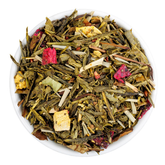Breaking the Habit: Discover the Benefits of Quitting Coffee for Good
Written by Stille Essence Tea
Are you ready to break free from the daily coffee grind and unlock a whole new level of energy and well-being? It’s time to explore the amazing benefits of quitting coffee and how it can transform your life for the better.
In this article, we’ll explore the incredible benefits of quitting coffee and how it can elevate your health in ways you never imagined.
Imagine waking up refreshed, enjoying deeper sleep, and feeling more hydrated and balanced—all without the need for that morning cup of joe. When you quit coffee, you'll also say goodbye to those annoying caffeine crashes and the jittery, anxious feeling that often follows too many cups of coffee. It’s not just about kicking the habit; it’s about reclaiming control of your energy and well-being.
We get it—quitting coffee isn’t always easy, but don’t worry. You’re not alone! We’ve put together some helpful tips and simple alternatives to make the transition smoother. Whether you’re curious about the benefits of a coffee-free life or ready to make the change for your overall health, this guide has got everything you need.
So, are you ready to give up the daily coffee fix and experience a new kind of energy—one that’s steady, natural, and way more sustainable? Let’s dive in and discover how quitting coffee could be the best decision you’ve ever made for your body and mind.
The Effects of Coffee on The Body
Coffee is one of the most widely consumed beverages in the world, and for many, it serves as a vital part of their daily routine. However, the impact of coffee on the body can be complex and multifaceted.

Caffeine, the primary active ingredient in coffee, is a central nervous system stimulant that can lead to increased alertness and temporarily alleviate fatigue. Many people rely on this stimulant to jumpstart their day or combat the afternoon slump. However, this reliance can also create a cycle of dependency, leading to increased consumption over time and potentially detrimental effects on health.
One of the most immediate effects of coffee consumption is its influence on heart rate and blood pressure. While moderate coffee intake can elevate heart rate and blood pressure temporarily, excessive consumption may lead to chronic hypertension.
Additionally, caffeine can cause the body to release more cortisol, the stress hormone, which can contribute to heightened feelings of anxiety and stress over time. For those with pre-existing heart conditions or anxiety disorders, the effects of coffee can exacerbate these issues, making it essential to consider personal health when deciding on coffee consumption.
Moreover, coffee can affect digestion and gut health. While some individuals may find that coffee stimulates their digestive system, others may experience adverse effects such as acid reflux or gastrointestinal discomfort.
The acidity of coffee can irritate the lining of the stomach, leading to increased production of stomach acid. This can result in a range of digestive issues, including heartburn and indigestion. Understanding how coffee interacts with your body is crucial for making informed decisions about its consumption and recognizing when it may be time to consider quitting.
The Benefits of Quitting Coffee:
Quitting coffee can be a transformative decision, leading to a multitude of benefits that extend beyond just reduced caffeine intake. One of the most significant advantages is the improvement in overall health.
By eliminating coffee, individuals often experience a decrease in anxiety levels and a greater sense of calm. This shift can be attributed to the reduction of caffeine-induced stress responses, allowing the body to function more harmoniously. Many people report feeling more balanced and less on edge after they stop relying on coffee for stimulation.
Another notable benefit of quitting coffee is the improvement in sleep quality. Caffeine has a long half-life, which means it can remain in the system for hours after consumption. For individuals who consume coffee, particularly later in the day, this can lead to disrupted sleep patterns and difficulty falling asleep.
By cutting out coffee, many individuals notice that they fall asleep more easily and experience deeper, more restorative sleep. This can lead to increased energy levels during the day, creating a positive feedback loop that enhances overall well-being.
In addition to mental and emotional benefits, quitting coffee can also have positive effects on physical health. Many people find that their digestive health improves significantly after eliminating coffee from their diet.
The absence of coffee can reduce symptoms such as bloating, heartburn, and gastrointestinal discomfort, leading to a more balanced digestive system. This improvement can enhance nutrient absorption and general well-being, making it easier to maintain a healthy lifestyle.

Increased Energy Levels and Improved Sleep
One of the most commonly reported benefits of quitting coffee is the significant increase in energy levels. Initially, it may seem counterintuitive to give up a beverage that is synonymous with alertness, but the reality is quite different. When individuals consume coffee regularly, they may experience a temporary boost in energy followed by a crash, leading to a cycle of dependency.
By quitting coffee, the body can begin to stabilize its energy levels naturally. This stabilization allows for more consistent energy throughout the day without the rollercoaster effect associated with caffeine consumption.
Improved sleep is another important advantage of quitting coffee. Caffeine can interfere with the body's ability to enter deep sleep stages, which are crucial for physical and mental restoration.
Many people who quit coffee report that they fall asleep faster and experience fewer disruptions during the night. This improvement in sleep quality not only enhances daytime alertness but also contributes to overall health and well-being. A well-rested body is better equipped to handle stress and perform daily tasks efficiently.
Additionally, the energy derived from a caffeine-free lifestyle often comes from healthier sources. With improved sleep and more balanced energy levels, individuals may find themselves more motivated to engage in physical activity or pursue hobbies that require focus and creativity.
This shift can result in a more active lifestyle and a better overall quality of life. The cycle of relying on coffee for energy can be broken, leading to a more sustainable and fulfilling approach to daily activities and responsibilities.
Improved Digestion and Gut Health
Quitting coffee can lead to remarkable improvements in digestion and gut health. For many individuals, coffee can be a double-edged sword; while it may stimulate bowel movements, it can also lead to discomfort such as acid reflux, bloating, and stomach cramps. Caffeine stimulates the production of stomach acid, which can exacerbate digestive issues, especially for those who are sensitive to acidity. By eliminating coffee, many people find that their digestive systems become more balanced, with reduced instances of discomfort.
Moreover, coffee can disrupt the gut microbiome, the collection of microorganisms that play a crucial role in digestion and overall health. The acidity of coffee can negatively impact the delicate balance of gut bacteria, leading to dysbiosis, which can manifest as digestive issues, inflammation, and even mood disorders.
Quitting coffee allows the gut microbiome to recover, supporting the growth of beneficial bacteria and promoting digestive health. This can lead to improved nutrient absorption and a stronger immune system.
In addition to physical changes, many individuals report a heightened awareness of their body's signals after quitting coffee. Without the influence of caffeine, people become more attuned to their hunger cues and overall well-being.
This newfound awareness can lead to healthier eating habits and a more mindful approach to nutrition. As the body adjusts to a coffee-free lifestyle, individuals may find themselves exploring a variety of foods that promote digestive health, such as fiber-rich fruits and vegetables, fermented foods, and whole grains.
Reduced Anxiety and Stress Levels
One of the most significant benefits of quitting coffee is the reduction in anxiety and stress levels. Caffeine is a known stimulant that can increase heart rate and trigger the release of stress hormones such as cortisol.
For individuals who are prone to anxiety, the effects of caffeine can be particularly pronounced, leading to racing thoughts, heightened feelings of nervousness, and physical symptoms such as palpitations.
By eliminating coffee from their diet, many people find that they experience a notable decrease in anxiety symptoms, allowing them to navigate daily stressors with greater ease.
In addition to the immediate effects of caffeine on anxiety, the long-term benefits of quitting coffee can also play a role in mental health. As individuals experience more stable energy levels and improved sleep quality, they may find that their overall mood improves.
Sleep deprivation and irregular sleep patterns can significantly contribute to feelings of anxiety and irritability. By opting for a caffeine-free lifestyle, individuals create a foundation for better mental health, fostering resilience against stress and anxiety triggers.
Furthermore, quitting coffee can lead to a greater sense of mindfulness and emotional regulation. Without the spikes and crashes associated with caffeine consumption, individuals may find themselves better equipped to handle stressors in a calm and composed manner.
This newfound emotional stability can enhance relationships and overall quality of life. As anxiety levels decrease, individuals can engage more fully in activities they enjoy, fostering a sense of fulfillment and happiness that was previously overshadowed by caffeine-induced jitters.
Clearer Skin and Healthier Teeth
Another surprising advantage of quitting coffee is the potential for clearer skin and improved dental health. Coffee is acidic, which can contribute to dental erosion and staining. Regular coffee drinkers often experience discoloration of their teeth, making it challenging to maintain a bright smile.
By eliminating coffee from their diet, individuals may notice a gradual improvement in the whiteness of their teeth and overall dental health. Additionally, the reduction in acidity can help protect tooth enamel, leading to fewer dental issues over time.
Clearer skin is another benefit that many individuals report after quitting coffee. Caffeine can contribute to dehydration, which can manifest as dry, dull skin. By eliminating coffee, individuals may find that their skin appears more hydrated and vibrant.
Furthermore, the improvement in sleep quality can have a direct impact on skin health. During deep sleep, the body undergoes essential repair processes, including the regeneration of skin cells. With better sleep comes healthier skin, allowing individuals to wake up with a more radiant complexion.
Moreover, quitting coffee can lead to a reduction in inflammation, which can further benefit skin health. Caffeine can act as an inflammatory agent for some individuals, exacerbating conditions such as acne and rosacea.
By adopting a coffee-free lifestyle, individuals may experience fewer flare-ups and a more even skin tone. As the body adjusts to the absence of caffeine, a holistic approach to skin care can emerge, focusing on hydration, nutrition, and self-care practices that support overall skin health.
Discovering New Caffeine-Free Alternatives:
Transitioning away from coffee doesn't mean relinquishing the comforting ritual of enjoying a warm beverage. There are numerous caffeine-free alternatives that can provide similar enjoyment without the stimulating effects of coffee.

Herbal teas, for example, offer an extensive range of flavors and health benefits. Chamomile, peppermint, and rooibos tea are all excellent choices that can promote relaxation and digestion, making them ideal substitutes for coffee.
Another popular alternative is chicory coffee, a caffeine-free beverage made from roasted chicory root. Chicory coffee has a rich and earthy flavor, resembling traditional coffee, making it a satisfying substitute for those looking to replicate the taste without the caffeine.
Additionally, it offers potential health benefits, such as improved digestion and reduced inflammation. Many people find that chicory coffee can be brewed in a similar manner to regular coffee, allowing them to maintain their preferred brewing methods.
For those seeking a boost of energy without caffeine, consider trying matcha or yerba mate. While matcha does contain some caffeine, it is often tolerated better than coffee due to its unique amino acid profile, which promotes a calm alertness. Yerba mate, on the other hand, provides a balanced energy boost and is rich in antioxidants. You can try our following products which brings a unique flavor and gentle caffeine boost.
Exploring these alternatives can not only enhance your beverage repertoire but also provide a sense of excitement and discovery as you transition to a coffee-free lifestyle.
Tips for Successfully Quitting Coffee
Successfully quitting coffee can be challenging, but with the right strategies in place, the transition can be made smoother and more manageable. One effective approach is to gradually reduce coffee intake rather than quitting cold turkey.
This method allows the body to adjust to lower caffeine levels without experiencing withdrawal symptoms such as headaches, fatigue, or irritability. Start by reducing the number of cups consumed each day or mixing regular coffee with decaf until the desired reduction is achieved.
Staying hydrated is also crucial during the process of quitting coffee. Caffeine is a diuretic, meaning it can lead to increased urination and dehydration. As you reduce coffee consumption, it's important to replace it with plenty of water and other hydrating beverages.
Herbal teas, infused water, and coconut water are excellent options that can help maintain hydration levels while providing flavor and enjoyment. Proper hydration can alleviate some withdrawal symptoms and contribute to better overall health.
Lastly, finding new routines and rituals can help fill the void left by coffee. Many people enjoy the ritual of brewing and sipping their morning cup, so replacing this habit with a new, enjoyable activity can be beneficial.
Consider exploring new morning routines such as meditation, yoga, or enjoying a healthy breakfast. Engaging in activities that promote relaxation and mindfulness can not only provide a sense of fulfillment but also help combat any cravings for coffee as you embrace your coffee-free lifestyle.
Conclusion: Embracing a Coffee-Free Lifestyle
Embracing a coffee-free lifestyle can be a transformative experience, leading to a plethora of physical and mental health benefits. From improved digestion and sleep quality to reduced anxiety and clearer skin, the advantages of quitting coffee extend far beyond the absence of caffeine.
While the initial transition may present challenges, the long-term rewards can significantly enhance overall well-being and vitality.
As you embark on this journey, remember that it's essential to listen to your body and approach the process with patience and self-compassion. The benefits of quitting coffee may take time to manifest, but the positive changes will be well worth the effort.
By exploring caffeine-free alternatives and establishing new routines, you can foster a fulfilling and enjoyable lifestyle without the dependency on coffee.
Ultimately, breaking the habit of coffee can lead to a newfound sense of freedom, empowerment, and vitality. As you navigate your coffee-free journey, keep in mind that every step you take toward a healthier lifestyle is a victory worth celebrating. Embrace the transformation and discover the vibrant energy that awaits you without the reliance on a daily cup of Joe.
















